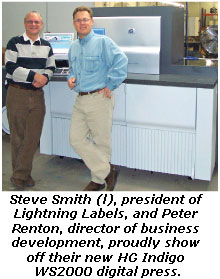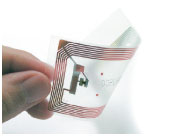Reporter Clips
- Published: January 31, 2006, By Edited by Deborah Donberg, Associate Managing Editor
Covering the Full Spectrum of Narrow Web Converting Industry News, Events & Activities
HP Strikes Twice at Label Converter
DENVER, CO—Lightning Labels knew from the beginning (2002) it wanted to focus on segments that often require short runs. To do this economically, the company set itself up as an all-digital shop. A good decision, apparently, since business necessitated a second HP Indigo WS2000 digital press, delivered a few months ago.

“There are a huge number of companies who want to order just 500 or 1,000 labels,” says founder Peter Renton, “but until recently these people have been ignored. The beauty of digital printing is that setup is quick and easy, which makes it economical to do runs as small as 500 labels.”
According to Lightning Labels president Steve Smith, quick setup isn’t the only advantage of Indigo presses. “The expectation is that when you are ordering just a few hundred labels, you have to compromise on quality. Nothing could be further from the truth. You are really getting Rolls Royce quality but on a Volkswagen budget.”
Lightning Labels prints for a range of industries, including wines, candles, lip balms, and water bottles. “Some days we have ten different customers who all want their labels urgently,” Smith explains. “The second press will allow us to handle these peak demand periods with ease.”
SUPPLIER INFO:
HP Indigo—hp.com
Raflatac Adds P-S Plant in China
SHANGHAI, CHINA—UPM’s Raflatac reports it will build a world-class p-s label stock production facility in Changshu, China, adjacent to UPM’s existing paper mill in the Jiangsu province. The total investment is approximately US$40 million.
Raflatac hopes to have the factory up and running by the beginning of 2007, at which time the current production facility in Shanghai will close.
Explains Raflatac president Heikki Pikkarainen, “We expect the demand for pressure-sensitive label stock in China to grow strongly in the coming years, driven by both the strong export industry and quickly developing domestic consumer goods markets.”

RFID Tag Use Keeps Growing
CAMBRIDGE, UK—Cumulative sales of RFID tags for the past 60 years totals 2.4 billion, with 600 million tags being sold in 2005 alone. This is among the findings of a new study of the RFID industry by IDTechEx.
According to “RFID Forecasts, Players and Opportunities 2006–2016,” $1.2 billion was spent on RFID tags in 2005, with $1.85 billion the total amount including tags, readers, services, etc. The expectation is that 1.3 billion tags will be sold in 2006, with about 500 million of these smart labels being used for pallet and case-level tagging. The majority will be used for diverse applications ranging from baggage and passports to contactless payment cards and drugs. The number of tags delivered in 2016 will be more than 450x the number delivered in 2006.
IDTechEx expects large, closed-loop markets requiring high-value RFID to remain profitable and companies to seek to position themselves as leaders in hardware and integration in different vertical market segments. Key issues will include challenges with tag yield vs costs, frequency acceptance, specification creep, and required performance levels.
Growth in passive RFID will be driven by the tagging of high-volume items such as consumer goods, drugs, and postal packages. The main benefits of these tags will be increased sales, improved safety, reduced crime, and improved customer service.
For more information on the study, visit idtechex.com.




